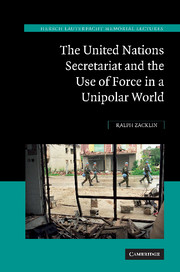Summary
When the British and French Governments launched the Suez invasion in 1956 Secretary-General Dag Hammarskjold was so shocked that these two permanent members of the Security Council could engage in such a shoddy deception and blatant violation of the Charter that he publicly rebuked them in an open meeting of the Security Council. ‘The principles of the Charter’, he said, ‘are by far greater than the Organization in which they are embodied, and the aims which they are to safeguard are holier than the policies of any single nation or people’. In his view, the Secretary-General must be a servant of the principles of the Charter and he made it clear that if Member States did not agree with that interpretation of his role he would step down.
In 2003 Kofi Annan engaged in no such public rebuke of the United States-led invasion of Iraq, nor did he publicly offer to step down. Of course, it could be argued that the two situations were completely different. Suez had been conducted in complete secrecy and the scheme concocted by the British, French and Israeli governments had been pieced together in a clandestine fashion. Iraq, on the other hand, had been conducted in the full glare of open meetings of the Security Council and unilateral pronouncements by the United States. The distaste of the Secretary-General for this American misadventure had been made known through the oft-repeated comment that in the absence of Security Council authorization the use of force would not be in conformity with the Charter.
- Type
- Chapter
- Information
- The United Nations Secretariat and the Use of Force in a Unipolar WorldPower v. Principle, pp. 155 - 158Publisher: Cambridge University PressPrint publication year: 2010

